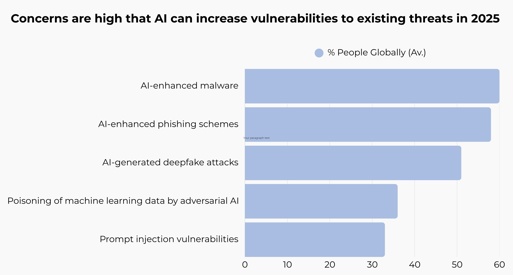Why AI Matters in Cyber Security Today
Cyber attacks are evolving at a pace that’s hard to keep up with. As someone who advises people on how to build a career in this space, it certainly keeps me on my toes!
Every week brings a new story of a breach, phishing scam, or ransomware strain more advanced than the last. The truth is, there’s simply too much data and too many threats for manual defences alone to cope. In addition, important to note is that the cyber threats and attacks themselves are increasingly being driven and propagated by, you guessed it, AI, as SHARP explain here in their article on How AI is Used for Cyber Attacks.
This is why using AI to fight these threats is important. By automating routine monitoring and analysing huge amounts of network data in seconds, AI helps security teams spot suspicious activity faster and respond before damage is done. Its biggest strengths lie in speed, accuracy, and the ability to learn as it goes. Something no human analyst could match on their own.
We’re seeing UK organisations adopt AI tools at scale. And interestingly, more employers are now asking for AI familiarity in Cyber Security job specs… a clear sign of how vital these skills have become amid the growing tech skills gap.
More specifically, in a government report, 49% of UK businesses claim to have a cyber security skills gap. So there’s a clear opportunity for those willing to learn.
AI is being used on the other side of cyber security... by hackers and bad actors
The National Cyber Security Centre's government report published earlier in 2025 states that "Proliferation of AI-enabled cyber tools will highly likely expand access to AI-enabled intrusion capability to an expanded range of state and non-state actors."
Put simply, the rise of AI tools and capabilities will enable hackers and bad actors to launch cyber attacks and threat for effectively. The only way to keep up with their developing methods is to use AI to combat cyber threats.

Key Uses of AI in Cyber Security
1. Threat Detection and Response
If you’ve ever worked in a Security Operations Centre, you’ll know how overwhelming the flow of alerts can be. I’ve spoken to many Analysts who say they spend hours sorting through false alarms, and that’s exactly where AI earns its keep. By scanning massive data streams in real time, AI can spot unusual behaviour or hidden patterns far faster than any human team could.
Machine learning models are trained to recognise phishing attempts, malware activity, or even subtle network anomalies that suggest a breach. Tools like Darktrace’s self-learning AI take this further by building a live understanding of what “normal” looks like inside an organisation — and flagging anything that doesn’t fit.
For you as a SOC Analyst or Penetration Tester, this means more time focusing on genuine risks instead of chasing noise.
2. Predictive Threat Intelligence
One of the most exciting things about AI is its ability to see around corners. Predictive threat intelligence systems can forecast potential attacks before they happen by analysing historical data, global threat feeds, and even hacker chatter across the dark web. IBM’s Watson for Cyber Security, for instance, processes billions of records daily to warn teams about emerging exploits.
If you’re thinking about where you might fit into this, roles like Threat Intelligence Analyst or Security Researcher are now closely tied to these tools. Understanding predictive AI gives you a real edge in building proactive defence strategies. Something many employers are now prioritising. You can explore where this fits in different cyber security career paths.
3. Automation and Incident Response
When an incident hits, minutes really matter. I’ve seen AI-powered automation shave hours off response times by instantly isolating infected devices or filtering false positives before a human even logs in. Platforms like Palo Alto Cortex XSOAR and Microsoft Sentinel are already doing this in practice.
It’s important to keep reminding yourself that AI doesn’t replace you; it supports you. Think of it as a teammate that handles the repetitive parts so you can focus on deeper analysis and strategic decision-making.
4. AI in Identity and Access Management
You’ve probably noticed how many platforms now verify identity using fingerprints, face scans, or behavioural patterns. That’s AI in action. Adaptive authentication systems use machine learning to understand normal user behaviour and adjust access controls accordingly. If someone logs in from a new location or device, AI might automatically ask for extra verification.
For Compliance Analysts and Security Engineers, this is becoming an everyday reality. AI is helping strike the balance between user convenience and robust protection. It’s a challenge that sits right at the heart of modern cyber security.

36 % of cyber budgets prioritise AI over other security domains
The global “Digital Trust Insights 2025” by PwC reports that 36% of cyber-security budgets now name AI investment as the top priority (ahead of cloud, network or data protection).

The AI Skills Every Cyber Professional Should Develop
One of the first things I tell people who are thinking about building AI knowledge for a career in cyber security is this: you don’t need to be a Data Scientist to use AI effectively in cyber roles. You just need to understand how these systems work, where they fit into your role, and how to use them confidently.
In cyber security, there are a few practical AI-related skills that can really boost your career prospects.
- A solid grasp of machine learning fundamentals helps you interpret how algorithms make decisions and spot when something looks off.
- Getting comfortable with security automation platforms (like SOAR tools) can also save you hours on manual work.
- Many professionals I’ve worked with also find that learning Python for data analysis and scripting helps them build smarter workflows and connect different systems.
- And if you enjoy investigative work, AI-driven threat intelligence and risk modelling will teach you how to predict and prioritise real-world risks.
If you’re looking to upskill, our Cyber Security courses cover these kinds of practical areas from AI-based defences to hands-on automation. We also pair learners with career coaches to help you turn those skills into real job opportunities.
The UK Government’s recent skills to 2030 report highlights AI and cyber expertise as priority areas for the decade ahead, which means professionals who learn to combine the two are likely to stay in demand for years to come.

Final Thoughts – Preparing for the Future of AI-Driven Cyber Security Careers
I've spoken to so many people over the last year who worry that AI will eventually replace cyber security jobs, but it won’t. What’s actually happening is that the work is evolving.
Employers are increasingly looking for cyber professionals who can use AI tools confidently and apply the human judgement that technology still can’t replicate.
We’re already seeing a rise in hybrid roles such as AI Security Specialist and AI Risk Analyst. Both positions that blend technical expertise with strategic oversight. These professionals don’t compete with AI; they collaborate with it to make security smarter, faster and more adaptive.
The key is learning with AI, not against it. If you can combine technical understanding with communication, critical thinking, and risk awareness, you’ll be well ahead of the curve.
Schedule a free call with one of our expert Cyber Career Consultants to take the first step toward a future-proof path.




